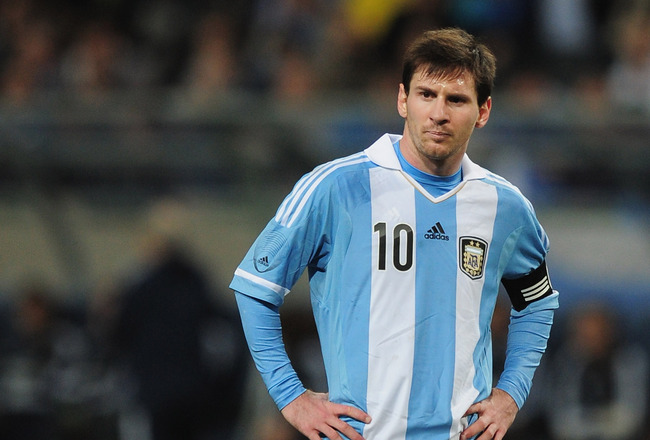The international career of Lionel Messi has not been the smooth affair that his life in club football has been.
There have been a series of ups and downs along the way, with the Argentine nation taking a fair while to take a shine to the Barcelona wunderkind.
That Messi does not perform for Argentina, though, is a myth. Even before his outstanding 2012 calendar year for La Albiceleste, he had been a major player for the side even if the goals had not flown as freely as he'd have hoped.
Next summer in Brazil, he will have the chance to ensure that his career is also remembered for success on the international stage. It will be the only way that he will ever convince some people.
With that in mind, let's take a look at the highs and lows of Messi's international career to date.
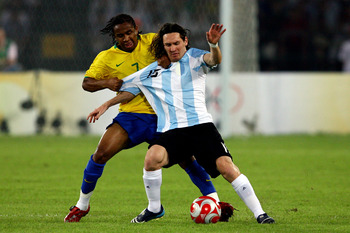
Shaun Botterill/Getty Images
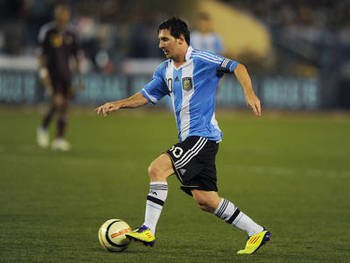
Fox Sports
There have been a series of ups and downs along the way, with the Argentine nation taking a fair while to take a shine to the Barcelona wunderkind.
That Messi does not perform for Argentina, though, is a myth. Even before his outstanding 2012 calendar year for La Albiceleste, he had been a major player for the side even if the goals had not flown as freely as he'd have hoped.
Next summer in Brazil, he will have the chance to ensure that his career is also remembered for success on the international stage. It will be the only way that he will ever convince some people.
With that in mind, let's take a look at the highs and lows of Messi's international career to date.
2005: Guides Argentina to Under-20 World Cup Win
Just 18 at the time, a young Lionel Messi had turned down the
opportunity to represent Spain at youth level in order to remain
faithful to the land of his birth. It is a decision that Argentines are
no doubt hugely grateful for.
With a handful of first-team appearances to his name, Messi's star was already on the rise. However, to most, he remained a relative unknown.
By the end of the tournament, the entire South American footballing community was certainly aware of his burgeoning talents. Messi finished the event with six goals to his name, including scoring in the final four rounds.
With a Golden Ball and Golden Boot to his name, as well as the World Cup title, the international career of Lionel Messi was well and truly underway.
With a handful of first-team appearances to his name, Messi's star was already on the rise. However, to most, he remained a relative unknown.
By the end of the tournament, the entire South American footballing community was certainly aware of his burgeoning talents. Messi finished the event with six goals to his name, including scoring in the final four rounds.
With a Golden Ball and Golden Boot to his name, as well as the World Cup title, the international career of Lionel Messi was well and truly underway.
2005: Sent off on International Debut
Just weeks after his Under-20 World Cup success, in August
2005, Messi was handed his international debut against Hungary in
Budapest.
Coming on as a 64th-minute substitute in the friendly encounter, the 18-year-old would last just one minute before seeing his debut cut short by a red card.
Having broken clear from his marker, the young Argentine had his shirt pulled by his opponent and unwisely, rather than maliciously, swung his arm in the direction of his opposite number.
The referee, just a few metres away, was in position to see the incident, and the debutant would see something of a false start to his international career.
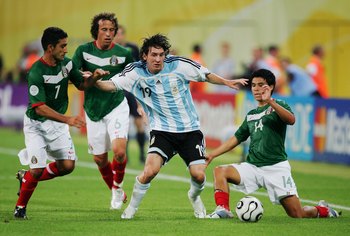
Clive Mason/Getty Images
Coming on as a 64th-minute substitute in the friendly encounter, the 18-year-old would last just one minute before seeing his debut cut short by a red card.
Having broken clear from his marker, the young Argentine had his shirt pulled by his opponent and unwisely, rather than maliciously, swung his arm in the direction of his opposite number.
The referee, just a few metres away, was in position to see the incident, and the debutant would see something of a false start to his international career.

Clive Mason/Getty Images
2006: Argentina's Youngest World Cup Player
A year later and it was time for a debut World Cup campaign for
Messi, but a campaign that was heavily disrupted by a right thigh
muscle tear heading into the tournament.
Appearing as a substitute in Argentina's second group-stage encounter with Serbia and Montenegro, Messi became the country's youngest ever player at a World Cup. Within minutes, he would also become Argentina's youngest ever World Cup goalscorer.
He would go on to start in a 0-0 draw against Netherlands in the final game of the group but would start on the bench for knockout ties with Mexico and Germany.
Of those ties, he would play just the final six minutes of the encounter with El Tri.
Appearing as a substitute in Argentina's second group-stage encounter with Serbia and Montenegro, Messi became the country's youngest ever player at a World Cup. Within minutes, he would also become Argentina's youngest ever World Cup goalscorer.
He would go on to start in a 0-0 draw against Netherlands in the final game of the group but would start on the bench for knockout ties with Mexico and Germany.
Of those ties, he would play just the final six minutes of the encounter with El Tri.
2007: Best Young Player at the Copa America
Those who like to say that Lionel Messi has always failed to
show up in major tournaments for Argentina clearly missed the 2007 Copa
America.
Still one of the youngest players in the tournament, Messi was influential throughout as he struck up a wonderful bond with playmaker Juan Roman Riquelme that saw Argentina cruise to a place in the final.
Contributing towards several goals en route to the final, as well as scoring two of his own in quarter-final and semi-final wins, he was undoubtedly one of Argentina's best performers at the event.
As reward for his efforts, Messi was named the Young Player of the Tournament by CONMEBOL despite a 3-0 defeat to Brazil in the final.
Still one of the youngest players in the tournament, Messi was influential throughout as he struck up a wonderful bond with playmaker Juan Roman Riquelme that saw Argentina cruise to a place in the final.
Contributing towards several goals en route to the final, as well as scoring two of his own in quarter-final and semi-final wins, he was undoubtedly one of Argentina's best performers at the event.
As reward for his efforts, Messi was named the Young Player of the Tournament by CONMEBOL despite a 3-0 defeat to Brazil in the final.

Shaun Botterill/Getty Images
2008: Olympic Gold Medallist
The 2008 Olympic Games was a memorable tournament for Argentine
football, with the side claiming a well-deserved gold medal while also
dispatching rivals Brazil 3-0 in the semi-final.
Having initially been barred from playing by club side Barcelona, Messi eventually talked his way into the squad and played a major role in the success.
Once more linking up with the wonderful Riquelme, Messi scored twice in the tournament but made his biggest contribution in assisting Angel di Maria for the only goal of the final.
Still just 20 years old, Messi now had a second major tournament win for Argentina to his name, even if neither had come at senior level.
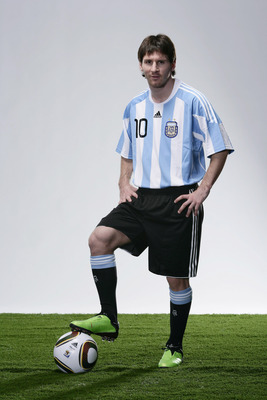
Getty Images/Getty Images
Having initially been barred from playing by club side Barcelona, Messi eventually talked his way into the squad and played a major role in the success.
Once more linking up with the wonderful Riquelme, Messi scored twice in the tournament but made his biggest contribution in assisting Angel di Maria for the only goal of the final.
Still just 20 years old, Messi now had a second major tournament win for Argentina to his name, even if neither had come at senior level.

Getty Images/Getty Images
2009: Wears No. 10 Shirt for First Time
By 2009, Messi was on course to win his first FIFA World Player
of the Year crown and had been busy setting the European game alight in
helping Barcelona to a famous Champions League success.
It was only now, though, that he could finally lay claim to the Argentina No. 10 shirt that is generally bestowed upon the team's leading playmaker. Until this point, it had been the prize possession of Riquelme.
Handed the shirt by none other than new manager Diego Maradona, Messi's status as the leading light of the Argentine game was now assured. Even if some still felt he was not performing for the national side.
It may seem a fairly meaningless high in his international career, but there is no doubt that wearing the No. 10 shirt for the first time would have been a source of immense pride for the Barcelona man.
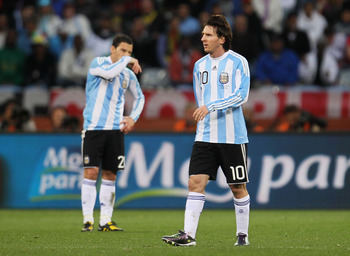
Chris McGrath/Getty Images
It was only now, though, that he could finally lay claim to the Argentina No. 10 shirt that is generally bestowed upon the team's leading playmaker. Until this point, it had been the prize possession of Riquelme.
Handed the shirt by none other than new manager Diego Maradona, Messi's status as the leading light of the Argentine game was now assured. Even if some still felt he was not performing for the national side.
It may seem a fairly meaningless high in his international career, but there is no doubt that wearing the No. 10 shirt for the first time would have been a source of immense pride for the Barcelona man.

Chris McGrath/Getty Images
2010: Scoreless at World Cup
There is a commonly accepted myth that Messi had a poor
tournament at the 2010 World Cup in South Africa, largely based upon the
fact that he was one of a number of star players who failed to score.
His performances, though, were far from poor and but for a series of inspired saves from Nigerian Vincent Enyeama in the side's first game, he could have kick-started his tournament with several goals to his name.
Installed as the playmaker in Maradona's side, Messi was heavily involved in many of his side's goals in the tournament even if he didn't make the scoresheet himself.
While some sections of the media sought to describe his tournament as a failure, FIFA's judges disagreed and nominated Messi on a 10-player shortlist for the Golden Ball award.
His performances, though, were far from poor and but for a series of inspired saves from Nigerian Vincent Enyeama in the side's first game, he could have kick-started his tournament with several goals to his name.
Installed as the playmaker in Maradona's side, Messi was heavily involved in many of his side's goals in the tournament even if he didn't make the scoresheet himself.
While some sections of the media sought to describe his tournament as a failure, FIFA's judges disagreed and nominated Messi on a 10-player shortlist for the Golden Ball award.
2011: Copa America Failure on Home Soil
Messi's tournament in the 2011 Copa America is also widely
remembered as a failure, but mainly due to the abysmal showing of Sergio
Batista's side at the event.
The Barcelona player himself, while he didn't score, was Argentina's most lively player on show and contributed several important assists to his side's cause.
Instead, while the likes of Ezequiel Lavezzi and Carlos Tevez floundered, Messi was criticised in the local media for his non-singing of the Argentine anthem (h/t Mundo Albiceleste).
Argentina were terrible, despite hosting the event, and were quickly knocked out on penalties in the quarter-finals by Uruguay. In truth, there was little Messi could do in a team that was sent out with no clear tactical direction.
The Barcelona player himself, while he didn't score, was Argentina's most lively player on show and contributed several important assists to his side's cause.
Instead, while the likes of Ezequiel Lavezzi and Carlos Tevez floundered, Messi was criticised in the local media for his non-singing of the Argentine anthem (h/t Mundo Albiceleste).
Argentina were terrible, despite hosting the event, and were quickly knocked out on penalties in the quarter-finals by Uruguay. In truth, there was little Messi could do in a team that was sent out with no clear tactical direction.

Fox Sports
2011: Named Argentina Captain
With Alejandro Sabella named as the new coach of Argentina
following the Copa America debacle, Messi was set for an immediate
promotion as he was named the captain of Sabella's national side.
Following the criticism of his commitment and performances at the tournament that summer, it was quite a show of faith from the new man in charge. Messi, though, has thus far rewarded him for his bold decision.
The Albiceleste are a different beast in 2013 to the dreary days of Maradona and Batista. Sabella has the side playing with confidence and structure, rather than the personality-driven free-for-all of the previous regimes. Messi, as is to be expected, is central to the side.
We won't know until the World Cup in 2014 whether Sabella is ultimately judged as a success or not. However, indications thus far suggest he is a vast improvement on his predecessors.
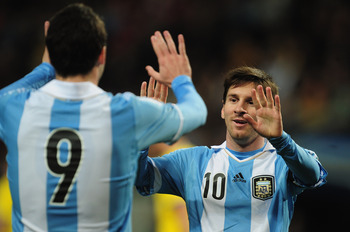
Jamie McDonald/Getty Images
Following the criticism of his commitment and performances at the tournament that summer, it was quite a show of faith from the new man in charge. Messi, though, has thus far rewarded him for his bold decision.
The Albiceleste are a different beast in 2013 to the dreary days of Maradona and Batista. Sabella has the side playing with confidence and structure, rather than the personality-driven free-for-all of the previous regimes. Messi, as is to be expected, is central to the side.
We won't know until the World Cup in 2014 whether Sabella is ultimately judged as a success or not. However, indications thus far suggest he is a vast improvement on his predecessors.

Jamie McDonald/Getty Images
2012: First International Hat-Trick Against Switzerland anf second agaiinst Brazil
With 12 goals in nine appearances, 2012 was by far the best
calendar year yet as far as Messi's performance at international level
is concerned.
Thriving on the responsibility of being made captain and a free role on the right side of the Argentine attack, he has long since quietened the doubters at international level.
Two performances stood out in 2012, as the diminutive forward scored the first two hat-tricks of his international career within the space of just three months.
First, all three goals in a 3-1 away victory over Switzerland broke his duck, before an incredible display in the United States helped Argentina to a 4-3 victory over a Brazil side preparing for the Olympic Games.
As Messi seemingly keeps getting better and better, it will be intriguing to see whether he can help inspire his country to World Cup glory next year as a famous Argentine No. 10 once managed in the past.
Thriving on the responsibility of being made captain and a free role on the right side of the Argentine attack, he has long since quietened the doubters at international level.
Two performances stood out in 2012, as the diminutive forward scored the first two hat-tricks of his international career within the space of just three months.
First, all three goals in a 3-1 away victory over Switzerland broke his duck, before an incredible display in the United States helped Argentina to a 4-3 victory over a Brazil side preparing for the Olympic Games.
As Messi seemingly keeps getting better and better, it will be intriguing to see whether he can help inspire his country to World Cup glory next year as a famous Argentine No. 10 once managed in the past.
